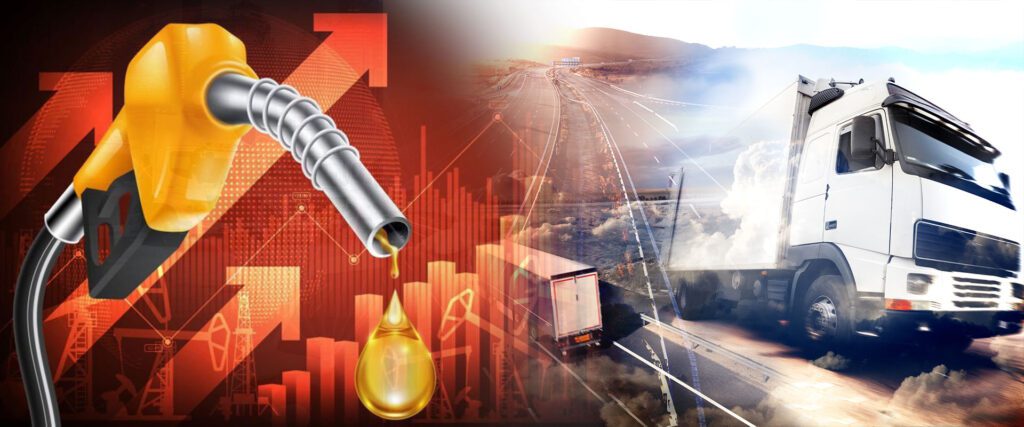Increased fuel cost is a matter of grave concern for most trucking companies. Though reducing fuel costs is not a new subject, it continues to hold a lot of significance. The current turmoil between Ukraine and Russia, has driven fuel prices northward and prices continue to rise everyday. In such a situation, it is essential to know how to increase fuel efficiency and look for ways to improve fuel economy.
All fleets, large and small, are always on the hunt for a secret formula that can help them improve fuel economy, and their bottom line. If you’re a truck owner or fleet manager, you would understand how a slight increase in fuel prices can significantly impact your business operations. So, what could you possibly do in such difficult times?
By using effective fuel management strategies, fleet managers and truck owners can identify areas in their operations where they can increase fuel economy, thus reducing costs and improving overall productivity.
How to Increase Fuel Efficiency
In this post, we will discuss how to increase fuel efficiency of your fleet by adopting simple ways that fleet managers and truck owners can use to reduce rising fuel costs and improve their bottom line through the use of advanced technology.
Improve Driver Efficiency
Factors such as extreme idling, driving beyond the speed limit, coasting, harsh braking, etc., can have a significant impact on your fuel economy. When fleet managers have visibility into each vehicle on the road, they can ensure that vehicles are being used in a fuel-efficient way. Through effective fleet management software, fleet managers can track the fuel consumed by the drivers in each trip, irrespective of the vehicle they are driving.
Follow a Preventive Maintenance Schedule
Following a preventive maintenance schedule of vehicles can also help fleet managers know how to increase fuel efficiency. Fleet companies that regularly provide proper maintenance to their vehicles have witnessed that those vehicles are far more fuel-efficient than those that are not.
Not many transportation companies may be in the position to purchase new vehicles due to restrained financial budgets. In such circumstances, it becomes inevitable for them to ensure existing vehicles are properly maintained, serviced, and optimized so they can go a long way in increasing productivity, reducing repair costs, and boosting fuel economy.
Fleet managers can ensure vehicles are maintained regularly by sending them to the repair shop before they need to be replaced with new ones. With regular car maintenance and optimization, vehicles can run smoothly on the roads, ensuring less fuel consumption.
Maintain the Speed Limit
Another fuel efficiency measure that most fleet managers can adopt is to ensure that drivers maintain the optimum speed limit on the road. Around 20% more fuel is consumed when the speed of the vehicle unexpectedly increases or decreases. The optimal fuel efficiency speed varies depending on the type of vehicle.
Maintaining the speed limit is not only crucial for the driver’s safety, but for efficient fuel management as well. Fleet managers need to encourage drivers to stick to the standard speed limit while driving. This will ensure better driver safety, better fuel economy, and help their fleet accomplish better mileage. It is recommended to deploy technology that helps you know your fleet’s speed and even allows you to set up alerts, notifying you when a vehicle exceeds the standard speed limit.
Protect Fuel Theft
Fuel theft is every fleet manager’s nightmare. Unfortunately, often employees turn out to be the culprits for siphoning fuel from the vehicles. In such scenarios, having visibility into the data can help fleet managers catch fuel theft right away, that would otherwise have remained unnoticed.
Fleet managers can compare the actual amount of fuel being burned to the amount purchased at the beginning and end of any given road trip. That way, they can keep a check on the amount of fuel that is actually consumed.
Again, technology can play a crucial role here. With the help of a fuel sensor, fleet managers can be instantly notified about the rapid fuel losses triggered by a vehicle issue or theft.
Improve Routing Efficiency
Optimized route planning is fundamental to the way a trucking company does business. Today, standalone and integrated solutions are available to enable fleets to improve fuel efficiency through more effective route planning.
Navigation systems can enable fleet managers to plan routes that are both fuel efficient and consistent with the parameters of a particular truck, the material being hauled and legal restrictions. Routes from the back office are synchronized in real-time to deliver guidance to the vehicle and driver.
Truck-specific route information can go a long way in decreasing out-of-route miles and in turn, increasing fuel savings
Again, technology can play a crucial role here. With the help of a fuel sensor, fleet managers can be instantly notified about the rapid fuel losses triggered by a vehicle issue or theft.
How to Improve Fuel Efficiency
Undeniably, technology plays a pivotal role in fleet management, helping businesses achieve new productivity levels and reducing fuel costs.
Innovative technology can help fleet managers address vehicle inefficiencies from different perspectives. Based on that information, they can create a comprehensive plan to cut back unnecessary fuel usage considerably. Furthermore, they can also seek the help of some helpful fuel management strategies to reduce fuel consumption.
As a result, fleet managers can improve their profit margins and reduce their fuel costs to a great extent. We hope we have been able to provide you some insight on how to increase fuel efficiency of your fleet through technology, especially by deploying effective fuel management software and implementing fuel management strategies in your business plan.



